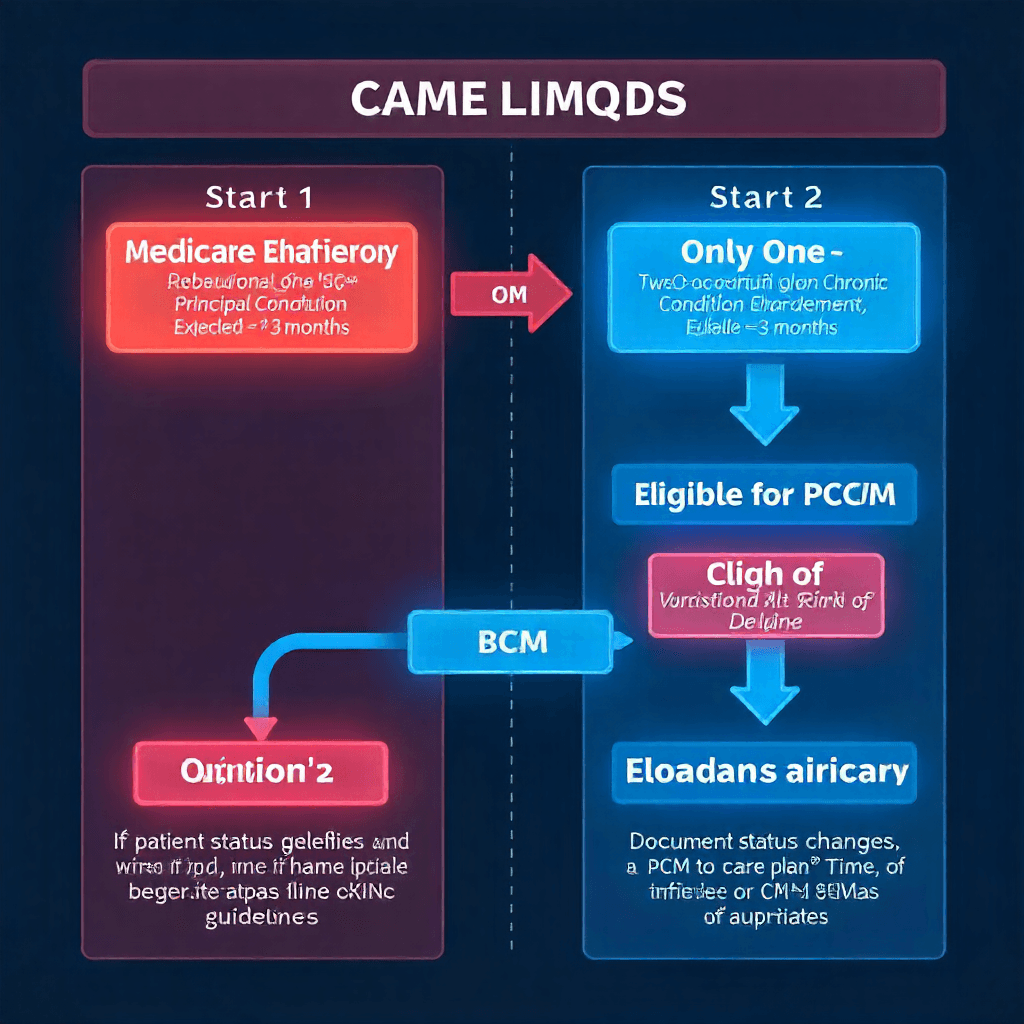PCM vs CCM: Key Billing Differences Physicians Must Understand
Chronic care delivery under Medicare has, in fact, evolved far beyond routine office visits. Primary care physicians and specialists now manage two key care coordination pathways: Principal Care Management (PCM) and Chronic Care Management (CCM).
While these programs might sound similar at first, they actually differ significantly in patient eligibility, billing rules, documentation, and clinical workflow. This article helps clarify those differences for physicians aiming to align with CMS guidelines and make the most of care management billing opportunities.
Clinical and Operational Scope: PCM vs CCM
PCM and CCM both support Medicare-recognized chronic care delivery, but their clinical intent and workflows are, well, not the same.
PCM: A Focused Model for One Condition
Principal Care Management (PCM) is used when a patient has one high-risk chronic condition expected to last at least 3 months. It’s often billed by specialists, or sometimes by PCPs managing a dominant condition (like COPD or CHF).
CCM: Broader Coordination for Complex Patients
Chronic Care Management (CCM), on the other hand, is designed for patients with two or more chronic conditions. These conditions must place the patient at risk of functional decline, hospitalization, or death.
To be honest, some physicians assume CCM can only be done by primary care, but specialists can provide it too, so long as it fits the clinical need and care coordination is justified.

Medicare Eligibility Rules for PCM and CCM
PCM Eligibility Requirements
- One serious chronic condition
- Condition must be the main focus of clinical management
- Initiating E/M or AWV visit is required
- Documented patient consent (verbal or written)
- Can’t overlap with CCM unless managed by same billing provider
CCM Eligibility Requirements
- Two or more chronic conditions
- Conditions must last at least 12 months, or until death
- Risk of hospitalization, functional decline, or death
- Initiating visit and consent required
- Can be billed with RPM or TCM if distinct
Important Note:
Many practices miss the initiating visit requirement for both CCM and PCM, leading to claim denials. Always double-check that part before billing starts.
CPT Code Logic and Time-Based Billing Structure
PCM vs CCM Service Details
| Service | Base CPT | Add-On | Provider Type | Min. Time |
|---|---|---|---|---|
| PCM | 99424 (MD) / 99426 (Staff) | 99425 / 99427 | MD/NP/PA or staff | 30 min/month |
| CCM | 99490 (Staff) / 99491 (MD) | 99439 / 99437 | MD/NP/PA or staff | 20 min/month |
To be fair, CPT codes can get confusing, especially if you’re also using RPM. Sometimes, staff document 99490 while the physician logs 99491, that’s fine, but CMS doesn’t allow the minutes to overlap.
Also, be careful not to report PCM and CCM in the same month unless they’re for different conditions and billed by different providers.
Documentation Scope: What’s Required for PCM vs CCM
For CCM
- A comprehensive, electronic care plan
- Address all qualifying conditions
- Include medications, DME, referrals, and goals
- Document non-face-to-face touches monthly
For PCM
- A focused care plan around the single condition
- Track labs, medication changes, symptom status
- Goals must relate to one targeted diagnosis
- Monthly communication required (telephonic or digital)
SmartCare360 can help you template both types of plans directly into your EHR. You don’t have to reinvent the process every time.
Workflow Design: Embedding PCM and CCM into Your EHR
Honestly, most issues around care management programs aren’t clinical, they’re workflow-based.
PCM Workflow Integration
- Physician-led touches (calls, portal messages, med reviews)
- Often paired with RPM for data-driven oversight
- Best for high-risk patients managed under specialty
CCM Workflow Integration
- Delegated to nurses or case managers
- Uses task-based care management system
- Can be blended with TCM, BHI, or AWV services
With SmartCare360, these workflows don’t require switching systems. Everything runs within the EHR layer, which reduces training, billing errors, and, well, staff burnout.
CMS Billing Compliance & Documentation Traps
Key Rules to Remember
- Consent must be documented clearly
- Initiating visit required
- General supervision is allowed for staff-led codes
- Time must be tracked to the minute, per calendar month
- Cannot double-bill PCM + CCM unless criteria are met
Many providers actually forget that time must be exclusive for each service. If PCM and RPM overlap in logging or staff entries, CMS can flag that during an audit.
SmartCare360 helps eliminate these issues by flagging code conflicts before submission. That’s a big deal for practices managing complex patient panels.
When to Use PCM vs CCM in Your Practice
PCM Is Ideal When:
- You’re a specialist managing a single high-risk disease
- The patient doesn’t qualify for CCM
- RPM is already active for the targeted condition
- You need to document condition-specific engagement
CCM Is Better When:
- The patient has multiple chronic issues
- There’s coordination between providers or locations
- You want a care team (RN/MA) to handle touchpoints
- You’re building a broader value-based strategy
Some practices use both. For example, a neurologist might manage epilepsy under PCM, while the patient’s PCP handles diabetes and CKD through CCM. That’s totally allowed, as long as billing doesn’t overlap.
FAQ's
What is the difference between PCM and CCM services?
PCM is for one high-risk chronic condition. CCM requires two or more. PCM is narrower; CCM is broader and more team-based.
Can a provider bill PCM and CCM at the same time?
Yes, if different providers manage different conditions. Documentation must show separate care plans and time.
Which CPT codes apply to PCM vs CCM billing?
PCM uses 99424–99427; CCM uses 99490, 99439, 99491, and 99437. Codes vary by staff vs physician time and minutes spent.
How many minutes are required for PCM compared to CCM?
PCM: 30 minutes per month. CCM: 20 minutes. Both have add-on codes for extended time.
Which patients are eligible for PCM vs CCM under Medicare?
PCM: One serious chronic condition. CCM: Two or more chronic conditions. Both require chronicity and documented risk of decline.











